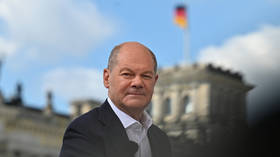Scholz criticizes German media over Ukraine conflict coverage
Berlin could convince more people “that it is right to help” Kiev if the media coverage was better, the chancellor has claimed
The media in Germany is to blame for the lack of public support for military aid to Ukraine, Chancellor Olaf Scholz claimed in an interview published on Monday. News outlets fail to ask the right questions to help the government make its case to the people, he said.
The chancellor noted that he is frequently asked by ordinary citizens whether the level of support Germany has been providing to Ukraine “is actually right.” However, in interviews with journalists, this question “is never asked” and therefore is rarely discussed in the newspapers and on TV and radio.
“The question of whether this is the right [thing to do] is hardly ever asked [by journalists],” Scholz told the Schwaebische Zeitung, adding that because of this, he has not been able to explain “why it is important to support Ukraine while remaining level-headed.”
Instead, according to Scholz, journalists focus on why Berlin is not sending even more weapons to Kiev.
If there had been more coverage on whether sending aid is the right course of action, “it would probably have been possible to convince more citizens that it is right to help,” he said.
In June, Scholz acknowledged that many Germans were unhappy about the continued aid to Ukraine, after his Social Democratic Party suffered a major setback in the EU parliamentary elections, winning as little as 7% of the vote in some parts of eastern Germany.
At the time, the chancellor said “many people do not agree” with Berlin’s Ukraine policy and sanctions on Russia, and this is “reflected in the election results.” Nevertheless, there is “no alternative” to supporting Ukraine, he claimed.
In his interview on Monday, Scholz insisted that Russia should not expect support for Ukraine to wane, and that Berlin will remain one of Kiev’s biggest supporters.
A poll in July suggested that zero percent of Germans were “fully satisfied” with the work of the ruling coalition, and over 81% of respondents expressed dissatisfaction with the government’s work.
Germany is the second-biggest donor of military aid to Ukraine, totaling over €10 billion ($11.19 billion) from January 2022 to June 2024, according to the Kiel Institute for the World Economy. Berlin has also provided Kiev with almost $5 billion in humanitarian and financial assistance over the same period, according to the think tank’s estimates.
In April, a poll conducted on behalf of the German broadcaster ZDF found that 82% of those questioned did not believe Ukraine could prevail against Russia, even with Western military aid.







Comments are closed.